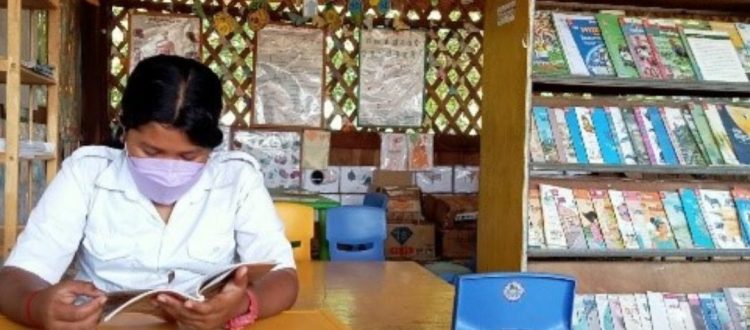Going to School is No Longer Difficult Safe Schools Programme Fulfills Children’s Dream to Learn
As the world emerges from the COVID 19 pandemic, children continue to face enormous threats impacting their health and education resulting from more frequent and intense disasters caused by natural hazards. The pandemic and natural disasters are not the only hurdles for students to overcome, unsafe and unhygienic surroundings are also seriously affecting their learning performance.
Supported by Prudence Foundation since 2013, Plan International has been implementing the Safe Schools programme based on the Global Comprehensive School Safety Framework across Southeast Asia since 2013. The 3-year programme period ending October 2022 saw over 130 primary and secondary schools in Cambodia, the Philippines and Thailand successfully built education resilience by improving school safety and disaster risk reduction management, as well as enhancing teachers’ and students’ knowledge of disaster prevention. With the support from the local governments and schools, the programme has reached over 23,000 students during the 3 years implementation period.
Building Safe School Environment Makes Students Feel Safe
“The school is old with no teaching facilities; although there are washrooms, they are filthy without water provision. We can’t even wash our hands. No classmates want to come to school.” 12-year-old Mei commented.
Far North in Cambodia, Mei was thinking of not going back to school. She did not concern about the school results but about how to travel to the school safely and learn effectively with limited resources. The journey to school was bumpy and became muddy during raining; without water provisions, the smell coming from the unattended washrooms was suffocating. Mei and her classmates started losing interest in studying. Moreover, the school is so old that there are no classrooms or teaching aids for students, let alone a decent library for students to read books. Without a comfortable learning environment, how could they enjoy going to school?
Through the child-focused “Safe Schools” Programme, Plan International installed hand washing stations in 60 schools and distributed educational materials including comics and posters to students which enabled around 10,000 students to maintain good health and fight against COVID-19. Mei could see that the school was improved in various ways, her interest in studying grew back. Now, the road to school is smooth as a gate and fence are constructed to protect the safety of students; classrooms with teaching aids and a new library allowed her to learn more effectively; male and female washrooms were set up, teachers and students no longer cover their noses and they, including students with disabilities, can clean hands after use; first-aid kit and medicine are also provided for emergency use. Back in 2016, the drop-out rate of this school reached 30%; with the transformation under this Programme, the rate plummeted to 7% because Mei and her classmates can now happily learn and play in school without fear and are getting ready for their bright futures.
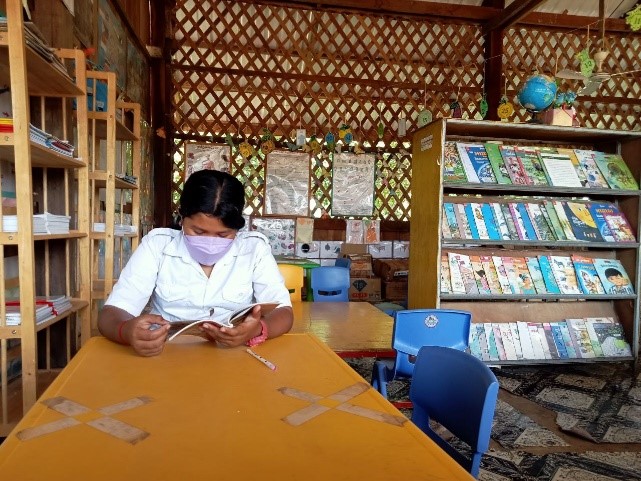
After the library was constructed, Mei could absorb extra knowledge.
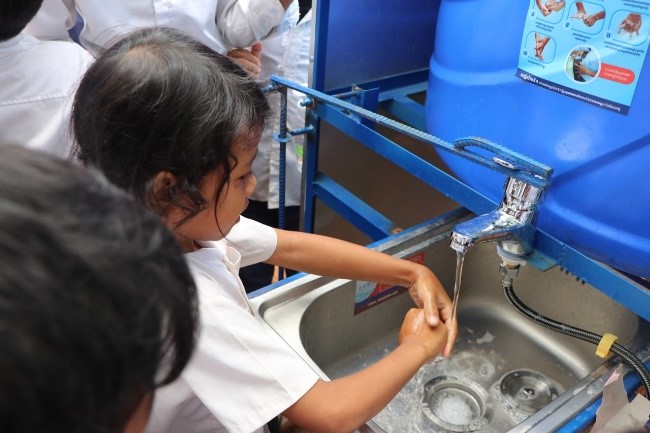
Over 200 primary schools were equipped with hand washing stations. Students are now able to use clean water for better health and safety.
School is the First Step to Promote Disaster Risk Reduction and Management Knowledge to the Community
Due to frequent typhoons and earthquakes, floods and landslides are not uncommon in the Philippines. Both Typhoon Rai in 2021 and the magnitude 7 earthquake in Luzon in 2022 caused huge casualties and damages. There is no exception to schools, they are often torn down and students’ learning was gravely affected.
On an island in West Samar Province, a secondary school teacher named Janet experienced Typhoon Haiyan in 2013 which killed 6,000 and resulted in 1,700 missing. After that, Plan International implemented the “Safe Schools” Programme and Janet was elected as the Disaster Risk Reduction and Management (DRRM) Coordinator. Through a series of training and renovations, Janet and her team developed school contingency and DRRM plans and crucial life skills including first aid. They also gained knowledge in water safety and established a student-led School Watching and Emergency Response Team to increase the students’ ability to respond to disasters.

Having witnessed the destructive power of typhoons, Janet realised the importance of DRRM and is dedicated to sharing the knowledge with parents and the communities.
Knowing that it was also important to promote safety to the community, Janet regularly invited the community leaders and representatives to join hazard drills and DRRM camps which ensured they are all well-prepared for disasters.
“Becoming the DRRM Coordinator pushed me to learn and grow, most importantly, I got a chance to protect my students and contribute to the community.” Janet shared.
The “Safe Schools” Programme has been implemented in the Philippines in areas like Samar, National Capital Region and Bangsamoro Autonomous Region in Muslim Mindanao for many years. Until now, a total of 12,000 children have benefitted and they have learnt more about how to minimise disaster risks and potential dangers.
Innovative Disaster Management Helps Create Safe Schools
Thailand is heavily influenced by monsoons and typhoons, the need to formulate disaster management is Plan International’s priority.
Since the start of the “Safe Schools” Programme, over 10,000 students’ lives are protected and they were able to continue studying. Some of the schools in Chiang Rai carry out regular drills to raise students’ and teachers’ awareness on hazard risks. In STEM and science classes, teachers introduce disaster risk reduction skills to students to train their abilities to identify and solve problems effectively and with creativity. During each semester, they will also conduct risk assessments for all buildings and surrounding areas to minimise possible damages and impacts.
Equal participation between girls and boys is also emphasized as girls could also create innovative works comparable to boys. Finally, to further promote disaster management across the country, support from the community and government is indispensable. It is hoped that disaster management will be incorporated into the school curriculum to protect the students’ safety.
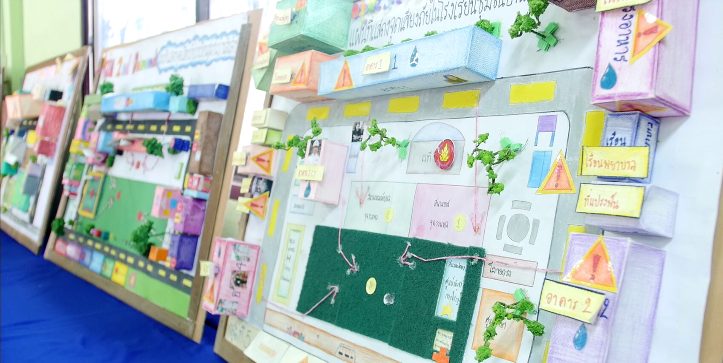
Students hand-made the 3D map which made learning disaster management more effective.
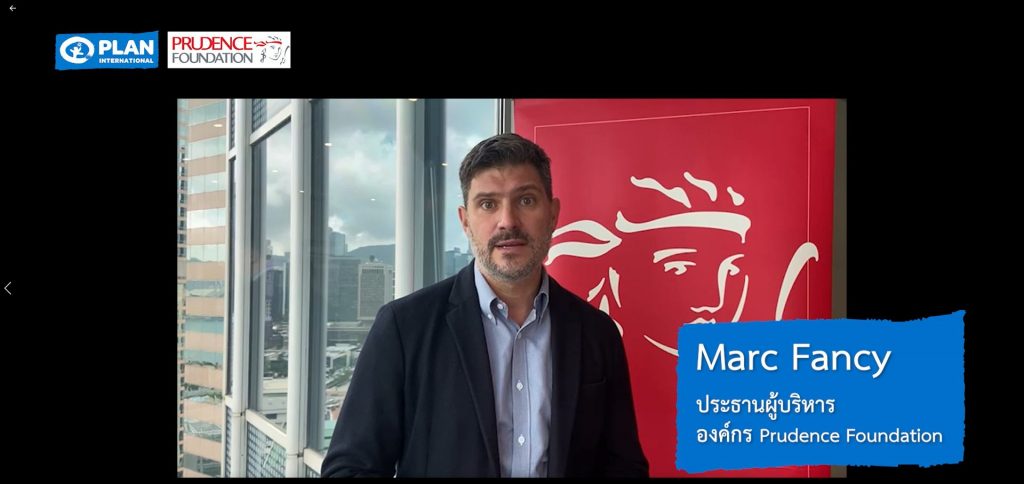
Mr Marc Fancy, the Executive Director of Prudence Foundation supported Plan International’s works in Thailand, hoping to extend the Programme across the country and look for more partnerships with the community and the government.
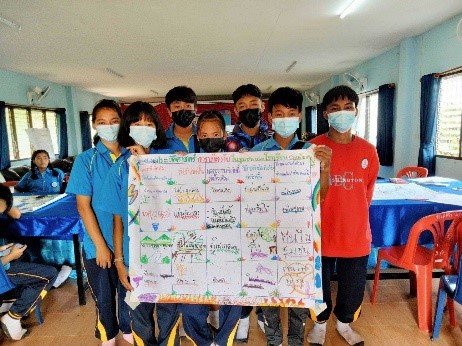
Students learnt more about disasters and related knowledge through classes.
